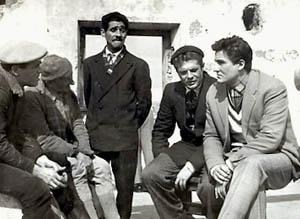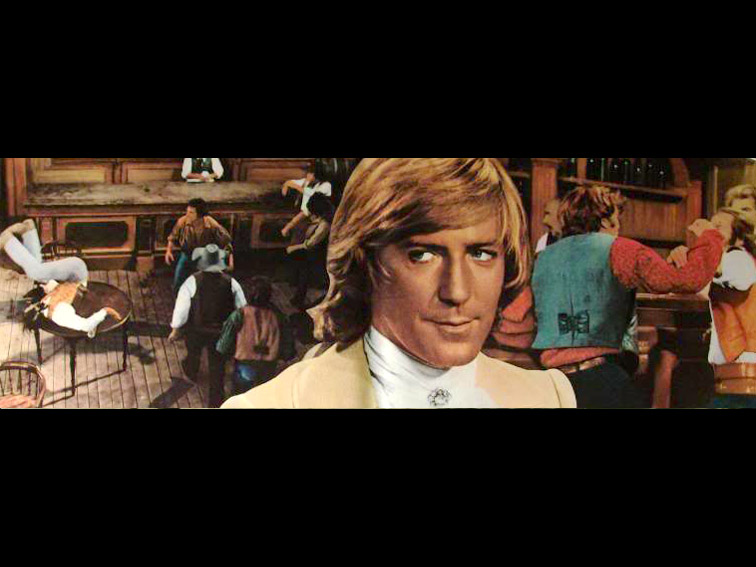
Tiberio Murgia has died. Here’s a rough translation of an article that appeared on an Italian website:
Tiberio Murgia, who died at the age of 81 after several months of illness in a nursing home in Tolfa, was one of the most famous faces in Italian cinema.
But, even now, after 155 films and a career lasting over 50 years, people are still surprised at the fact that he wasn’t born in Sicily. In reality, he was a true Sardinian, born in Oristano in 1929, and the island still had a strong place in his heart. The misconception was all down to Mario Monicelli who, in 1958, was looking for a Sicilian face to add to his band of thieves – Gassman, Mastroianni, Toto – in the 1958 film I soliti ignoti. He was spotted in the restaurant Il re degli Amici, in via della Croce, with his haggard face, thin body and nervous look. He worked there as a dishwasher, but Monicelli called him in for an audition at Cinecittà. Tiberio was unfamiliar with the world of cinema, and didn’t even know what a screen test was. However, he went in front of the director, along with nine other people the director had chosen from the street, all of whom were from Siciliy, and spent a long day doing a screen test. Franco Cristaldi, the producer, wanted someone else. Monicelli, though, was adamant, Tiberio Murgia had to be Ferribotte.
After this, the life of the Sardinian unkown changed dramatically. After shooting the film, he returned to work, but he couldn’t understand why people were shouting Sicilian jokes to him in the street. He didn’t even realise that the film was a success, because he was expecting it to be released under the title Le madame. But then the producers, having tried in Sardinia, tracked him down and offered him a contract worth millions. “Ten million, to be exact, I’d never seen so much money,” he recalled. And the unknown Sardinian became a movie star.
Or, rather, the king of character actors. Because the part of the Sicialian – jealous, possessive, cuckold, with a roguish moustache, hair pulled back, haughty bearing and crooked jaw – was a brand that he both devoured and became a prisoner of, in both film and TV adverts. Only twice in his 155 films did he play a Sardinian: as a shepherd in a couple of scenes of Attila flagello di Dio and as a funny kidnapper, the head of the Brigate pecorine. Moreoveer, he was also dubbed (by Renato Cominetti, predominantly) and became trapped by several catch phrases: «peccato di pantalone, pronta assoluzione», «Cammela, componiti», «Femmina piccante, prendila per amante; femmina cuciniera, prendila per mugliera»
Curiously, though, it was this Sardinian who popularised Sicily and the stereotyped figure of the Sicilian in Italian cinema, before Franco & Ciccio and Lando Buzzanca became iconic figures. IN 1961, when Vittorio Da Seta, who was from a noble Sicilian lineage, directed Banditi a Orgosolo, he made 12 films.
It was one of the paradoxes of cinema, but it was also a parable of the artistic and human Murgia: a strange story, seasoned by his temper (in private he could be strict and arrogant) but tempered by a heart of gold. He made as many as 50 films in the 60s, made numerous sexy comedies in the 70s but then slowed down as the Italian comedy film declined. But his curriculum was unusually rich. He worked during the golden age of Italian cineam, alongside the likes of Toto, Sordi, Gassman, Manfredi, Mastroianni, Monica Vitti, Claudia Cardinale. And Maurizio Arena, Renato Salvadori, Amedeo Nazzari, Franco Fabrizi, Leopoldo Trieste, Franchi and Ingrassia, Walter Chiari, Ugo Tognazzi, Adriano Celentano, Paolo Stoppa, Ernesto Calindri, Alvaro Vitali, Jean and Ric. And, in his later years, Liana Orfei Gina Rovere and Gloria Guida. Not to mention foreign stars like Victor Mature Peter Sellers, Louis De Funes. And, besides Monicelli, he was directed by filmmakers such as Vittorio De Sica and Nanni Loy.
If he made the Sicilian character his own, he was rarely given the opportunity to expand it by myopic producers. He played mafia men, policemen, drivers, station masters, sergeants, cownboys, tailors, barbers, but always with the same poise and bravado, a plebeian who tries to mask his nature with the attitude of a fallen noble.
After all, Murgia had himself suffered from hunger in Sardinia, where he was the third of nine children, before working as a laborer, newsboy and kitchenboy.
